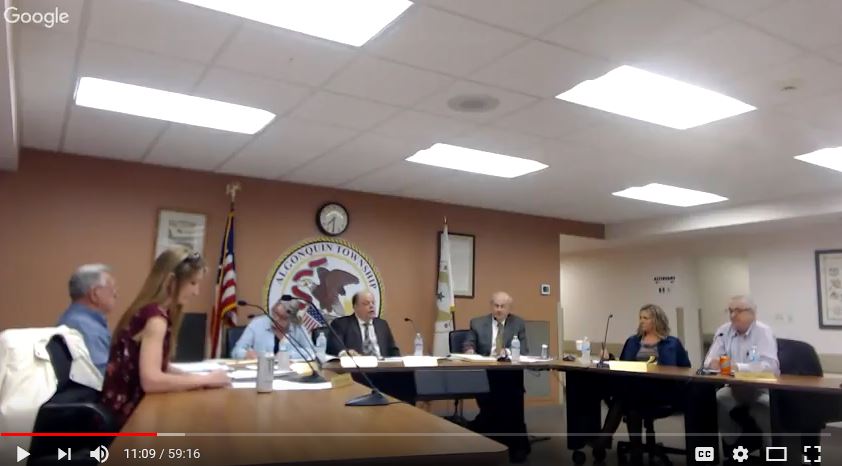ALGONQUIN, IL. (ECWd) –
When a Township donates taxpayer funds to a museum, for instance, the McHenry County Historical Society and Museum, there are certain things that must be accomplished according to law.
Algonquin Township failed to comply with the law while their attorney sat through the meeting with them, and the MCHS failed to comply with state law’s reporting requirements to the Township.
Section 275-15 of the Illinois Township Code spells out those requirements in a way that even this township’s attorney could understand if he decided to read it:
<span style="font-family: Courier New; font-size: small;">(60 ILCS 1/275-15)</span><span style="font-family: Courier New; font-size: small;"> </span> <span style="font-family: Courier New; font-size: small;">Sec. 275-15. </span><span style="font-family: Courier New; font-size: small;"><span style="text-decoration: underline;"><strong>Use of funds; financial statement.</strong></span> </span> <span style="font-family: Courier New; font-size: small;">(a) Any funds paid to a not for profit museum or historical society must be used solely for the maintenance and operation of the museum or historical society.</span><span style="font-family: Courier New; font-size: small;"> </span> <span style="font-family: Courier New; font-size: small;">(b) <span style="text-decoration: underline;"><strong>Within 60 days after the close of the fiscal year</strong></span> of any museum or historical society for which funds were provided under this Article, the museum or historical society that received the funds shall file with the township clerk a <span style="text-decoration: underline;"><strong>complete statement of the financial affairs</strong></span> of the museum or historical society for the fiscal year. The statement <span style="text-decoration: underline;"><strong>must be verified under oath and must show</strong></span>, for the fiscal year, <span style="text-decoration: underline;"><strong>(i)</strong></span> the amount expended in the maintenance and operation of the museum or historical society and the reasons for the expenditure; <span style="text-decoration: underline;"><strong>(ii)</strong></span> the amount of township funds received; <span style="text-decoration: underline;"><strong>(iii)</strong></span> the amount and source of any other funds received for those purposes; and <span style="text-decoration: underline;"><strong>(iv)</strong></span> the amount remaining on hand for maintenance and operation of the museum or historical society. The township clerk shall record the statement in the record book of the township and shall cause the statement to be published in a newspaper having general circulation in the township within 30 days after it is filed with the clerk.</span><span style="font-family: Courier New; font-size: small;"> </span><span style="font-family: Courier New; font-size: small;">(Source: Laws 1967, p. 82; P.A. 88-62.)</span>(a) Any funds paid to a not for profit museum or historical society must be used solely for the maintenance and operation of the museum or historical society. (b) Within 60 days after the close of the fiscal year of any museum or historical society for which funds were provided under this Article, the museum or historical society that received the funds shall file with the township clerk a complete statement of the financial affairs of the museum or historical society for the fiscal year. The statement must be verified under oath and must show, for the fiscal year, (i) the amount expended in the maintenance and operation of the museum or historical society and the reasons for the expenditure; (ii) the amount of township funds received; (iii) the amount and source of any other funds received for those purposes; and (iv) the amount remaining on hand for maintenance and operation of the museum or historical society. The township clerk shall record the statement in the record book of the township and shall cause the statement to be published in a newspaper having general circulation in the township within 30 days after it is filed with the clerk. (Source: Laws 1967, p. 82; P.A. 88-62.)
The Historical Society or museum must provide a complete statement of the financial affairs [for the fiscal year], verified under oath, and that financial statement must show the four things listed above. Additionally, the Township Clerk must publish the financial statement in a newspaper within 30 days of receiving it.
See what Algonquin Township Clerk expected to pass off as their “complete statement of financial affairs” (FY2017) and you will find the following required items are NOT contained in this document:
- verified under oath
- amounts expended for maintenance and operation and the reason for the expenditure
- amount of Township funds received
- amount and source of any other funds received for those purposes
- amount remaining on hand for the maintenance and operation
This “report” fails the smell test, but the township willingly doled out more taxpayer funds to an organization that apparently did not comply with reporting requirements – or the township failed to keep the reports. We did get the financial report for FY2015, and it did contain more information than this pie-chart 2017 report, but it was incomplete also.
Here is the video of the May 14, 2018 donation discussion:
Upon hearing the excuses used to donate once again this year, I requested the financial reports and proof of publication from the Algonquin Township Clerk. As suspected, nothing was in compliance with the Township Code, and this donation should never have been made.
Why spend money on an attorney to attend these meetings if he is not going to provide the legal direction on such matters?
.
Our work is funded entirely thru donations and we
ask that you consider donating at the below link.









3 Comments
Keep Following the Money . . .
Posted at 09:03h, 07 JuneThere is some blame to share beyond the township’s lawyer and township officials, although they deserve the majority of the blame. The historical society has “staff” and volunteers. They have a lot of staff: https://mchenrycountyhistory.org/mchs-staff. One of those staff members has a master’s degree in public administration!!!
Usually, historical societies run on great-grandma and great-grandpa power, and are all volunteers. I can name six historical societies with facilities and boards run by octogenarians and nonagenarians. While I might forgive a group of well-intention ninety-year-olds for some oopsies and not being able to keep up with all of the laws, this historical society has “staff” and one of those staff members has a master’s degree in public administration, who should know better.
There are a couple of board members described as having professional experience, too: https://mchenrycountyhistory.org/mchs-board-members
MCHS does not get a pass for ignorance of the laws.
Follow the money . . . they have too many “staff” members for a historical society. They should be running on all volunteers with a shoestring budget enough to keep the utilities paid and the roof, etc. repaired.
On free admission, most of the historical societies and museums have admission on “free will” and/or “suggested” donations. Some of them are as low as one dollar. Folks on low incomes and kids could get by without paying for admissions at those places. Those are generally places run on great-grandma power.
Usually, historical societies and museums are lovely, friendly places. One of the best has free admission and is run by a great-great grandma, with income generated by its store.
Jannie
Posted at 07:23h, 07 JuneWhat I don’t understand is why the township was even donating money to the Historical Society/Museum – it makes no sense. In my experience most public bodies keep their money close — is the Museum owned by the township? I can’t figure out why the township board is giving out taxpayer money to the historical socieity/museum.
Cindy
Posted at 23:49h, 06 JuneWith the exception of Rachel, every one of those morons need to resign immediately! It has become abundantly clear that these fools have no idea what they are doing.